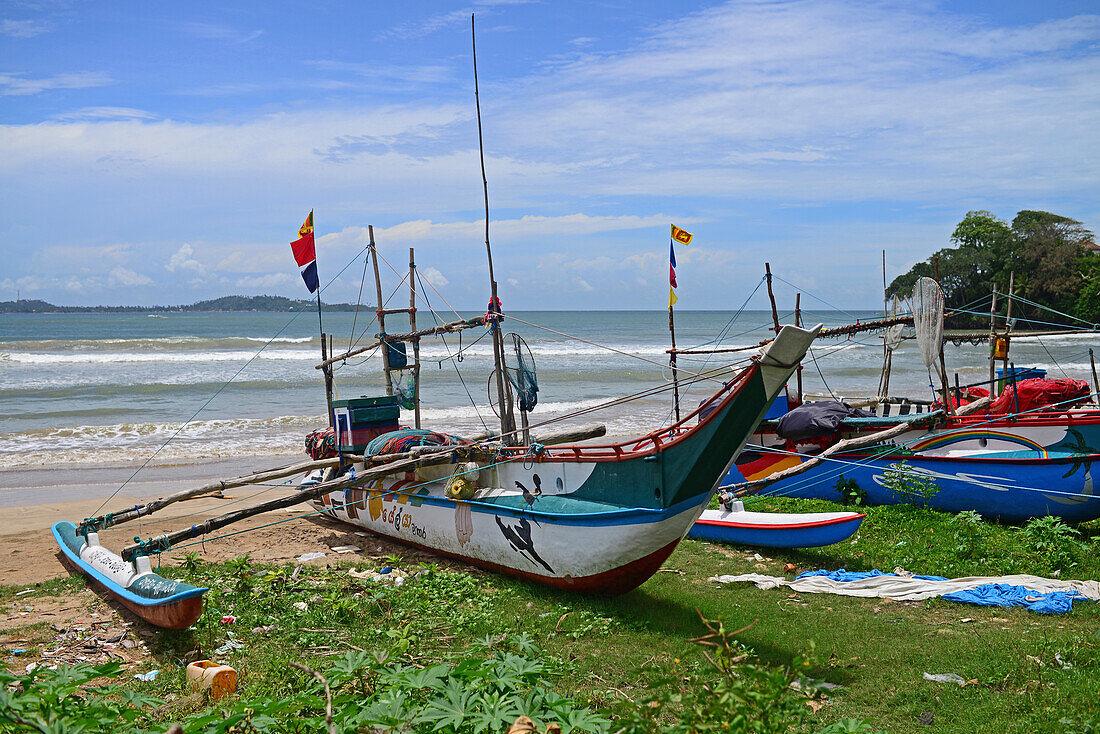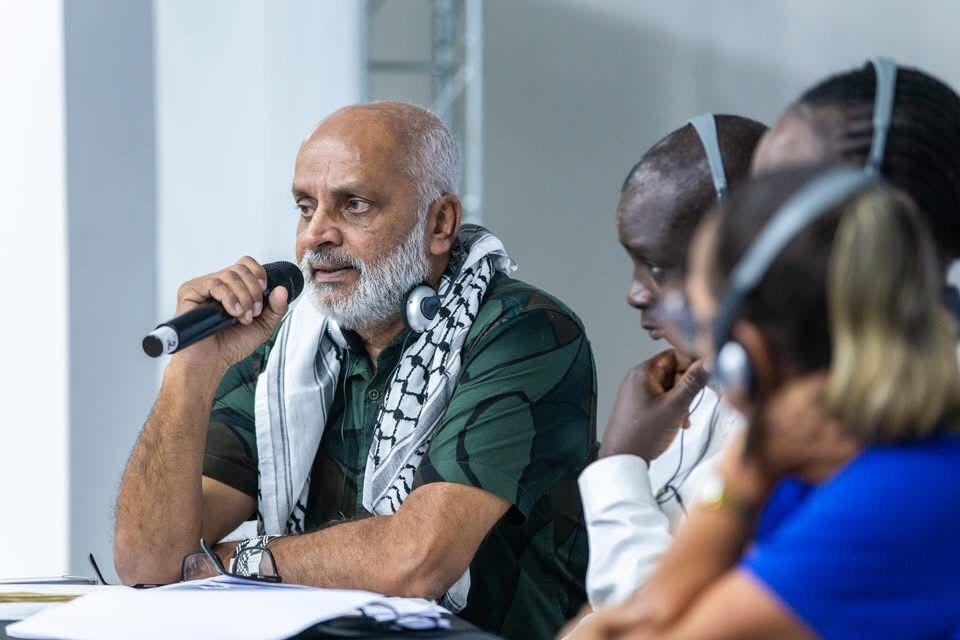Reply To:
Name - Reply Comment

This interview with Harman Kumara, Secretary General of the World Forum of Fisher People (WFFP) and Convener of National Fisheries Solidarity Movement (NAFSO), focuses on the critical need for unity among Sri Lankan fishermen. Kumara emphasizes that overcoming regional, ethnic, and religious divisions is essential for addressing the challenges facing the fishing community. He also highlights the importance of amplifying the voices of youth and women within the industry and details efforts to create unified organizations and promote dialogue, including addressing issues with Indian fishermen in Sri Lankan waters. He also discusses the role of the World Fisheries Conference and the significance of International Fishermen's Day.
Fishermen from both the North and South must unite to amplify the voices of youth, women, and their peers, putting aside regional, ethnic, and religious differences. In light of the serious challenges facing the fishing community in the country, the Daily Mirror interviewed Harman Kumara, Secretary General of the WFFP and Convener of the NAFSO.
Kumara emphasized the critical need for collective action among fishermen to foster development within the industry, highlighting that unity is essential for overcoming obstacles and achieving sustainable solutions.

Harman Kumara - Secretary General of the World Forum of Fisher People (WFFP) and Convener of National Fisheries Solidarity Movement (NAFSO)
Q: You are serving as the Secretary General of the World Fisheries Conference for the third time. What is the role of this position, and what recognition and benefits can it bring to the country?
A: Yes, this is my third term as the Secretary General of the WFFP. My first term was from 2004 to 2008, and my second term was from 2008 to 2014. Now, I am serving my third term, from 2023 to 2027.
Because of this, the WFFP Secretariat is now based in Sri Lanka.
However, I initially declined this position because the workload was too heavy. But I accepted it after many countries requested me to continue.
The World Fisheries Conference represents 70 countries, including nations from Asia, Africa, the Pacific, Europe, America, the Caribbean, and Latin America. The co-chairs are from Senegal and Belize, and the treasurer is from Kenya. The first conference was held in New Delhi, India, in 1997.
One of the main goals of the WFFP is to support small-scale fishermen. This includes protecting their professional rights, improving their living conditions, and addressing the problems they face. The conference also creates a strong global voice for fishermen.
This year, the 2023 General Conference was held in Brazil. We focused on stopping the overuse of marine resources and preventing environmental disasters. We are working with the World Food and Agriculture Organization to fight poverty among small-scale fishermen and tackle hunger. This involves addressing food security, ensuring land rights, protecting the environment, providing more job opportunities, and defending the right to life for small-scale fishermen.
Q: What is expected from the celebration of International Fishermen's Day? What is the significance of celebrating this day for Sri Lanka?
A: We know that International Fishermen's Day is celebrated every year on November 21. This date marks the first meeting of the World Fishermen's Conference held in Delhi in 1997.
The day is celebrated with great enthusiasm by fishing communities worldwide. In Sri Lanka, we also celebrate it with much excitement.
However, I feel that society and the media do not give enough attention to this important day. As mentioned earlier, Fishermen's Day is significant because it is the only day dedicated to recognizing the contributions of fishermen.
As an island nation with a thriving fishing industry across the country, this day should be celebrated not just by fishermen but by everyone in Sri Lanka. National, regional, and global fisheries organizations, including the World Fisheries Conference, work with the Food and Agriculture Organization (FAO) and the Geneva Human Rights Commission to improve the living conditions of small-scale fishermen and to protect their rights. They also highlight the vital role fishermen play in the global food supply and economy.
Additionally, fisheries organizations at the national and regional levels maintain strong ties with the FAO to ensure ongoing support for fishermen.
Q: Like farmers, fishermen are professionals who quietly contribute to the country’s GDP. We often hear the voices of farmers, usually through their representatives. However, when it comes to fishermen, we don’t see the same peace, harmony, and unity. There is little to no representation for them, and their voices remain unheard. Why is that?
A: The truth is that fishermen’s voices are not heard as much as farmers’. However, like farmers, fishermen face many challenges and issues. Society often sees fisheries problems only as increases or decreases in fish prices.
But a minority of fishermen struggle with issues like poor living conditions, difficulties in running their industry, rising costs of fishing gear, and the fuel crisis.
Unfortunately, these concerns are rarely highlighted in society. However, there are fishermen’s unions and cooperative organizations across the country, and some of these have combined to form national-level organizations.
I represent one such organization—NAFSO, the "National Fisheries Cooperation Movement." It is a national-level fisheries organization that connects us to the World Fisheries Federation. As its Secretary General, I can share that the Secretariat of the World Fisheries Federation is currently based in Sri Lanka, in Negombo.
To answer the question, our national network works hard to support the fishermen of Sri Lanka. Sadly, these efforts are not as visible or prominent as those of farmer organizations.
Since 2012, we have been working with various governments to establish a policy on the rights of minority fishermen, which was passed in 2014. We continue to work with the current government, as well as previous ones, to ensure its implementation. To achieve this, fishing organizations, officials, and politicians must come together on a single platform.
Q: Don't you think that fishermen should not be divided into North and South, but should work as one group to protect their rights, welfare, and develop the industry?
A: Yes, for the development of the fishing industry, it is important for everyone to come together as one group, no matter their differences in region, ethnicity, or religion. However, the real problem is that even though the 30-year civil war in the country has ended, there is still no proper relationship, understanding, or peaceful coexistence between the North and South.
We are working to fix this. In the North, there are already agreements and unity among the fishermen.
However, in the South, the situation is much worse. It is also difficult to build unity there, possibly because of politics.
Q: What measures have you taken to bring them together as a single group of professionals, regardless of race, religion, caste, or creed? Do you have any such program?
A: We are already working on it. We have formed the "National Fisheries Trade Union" by bringing together fishing organizations from the North and South as part of a national fisheries cooperation movement. We have also created the "National Women Fisheries Union" by uniting women in fishing, and for the youth, we have set up the "National Youth Trade Union" to promote equality, peace, and coexistence among different religions and races.
Additionally, the #Unity4Humanity team, which is part of our organization, recently organized a program called Peace Academy with the participation of young people from 8 districts. The goal was to create a group with national-level social awareness and understanding, focusing on coexistence, environmental conservation, and tackling climate change.
Q: What is your perspective on the recent incidents of fishing theft by Indian fishermen in the North? How are you addressing these challenges? Additionally, what steps have you taken to organize Sri Lankan fishermen to respond effectively to this situation?
A: We took action to protect Sri Lankan maritime zones by educating fishermen from both countries as a sustainable measure in 2004.
We met and discussed with the Rameshwaram Fishermen's Associations and fishing businesspeople, and by 2011, we had started a dialogue process to stop Indian fishermen from completely violating Sri Lankan maritime zones.
In addition, we traveled from Rameswaram to Nagapattinam in India and held these discussions to educate the fishing community. A group of 25 people, including Sri Lankan government officials, civil society organizations, religious leaders, journalists, and others, participated in this. It was a very successful discussion and tour.
This was purely a People-to-People Dialogue intervention. However, without political support at the last minute, it was sabotaged. This was an opportunity that could have led to very good results.
For now, we can say that Indian fishermen have stopped violating our maritime zone. But we are at a point where it needs to be implemented again. Yes, it needs to be implemented again.